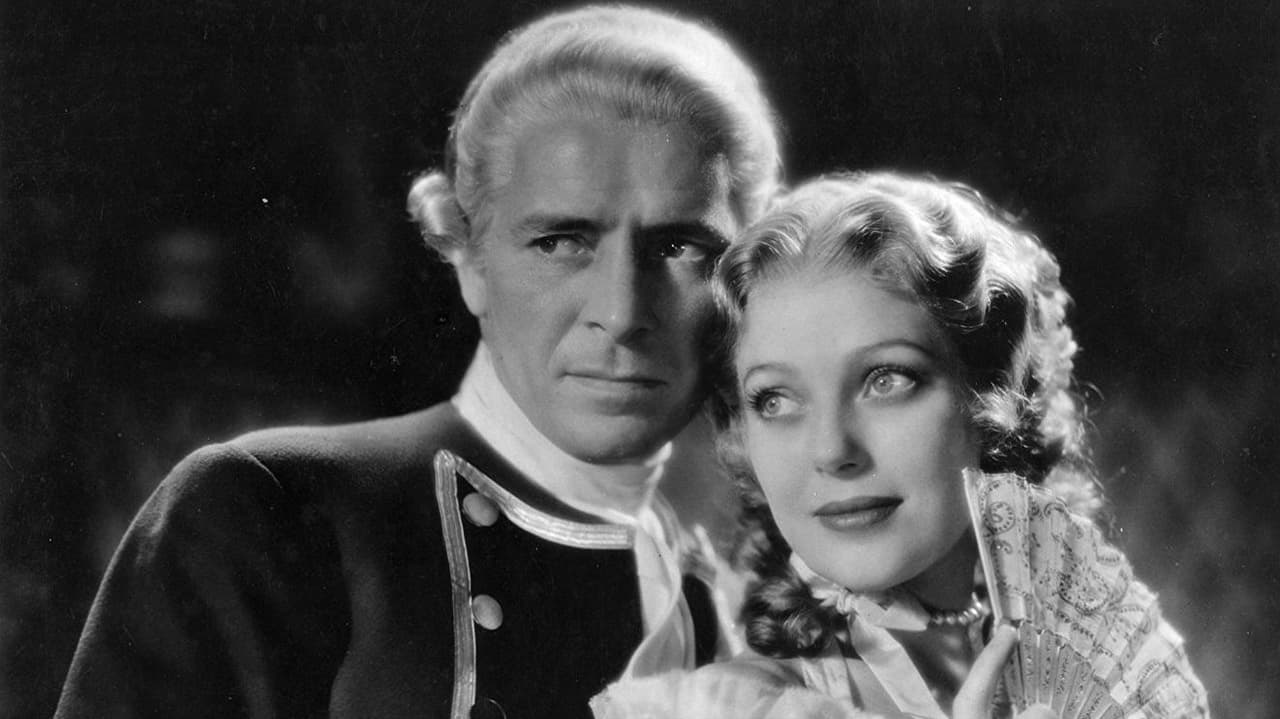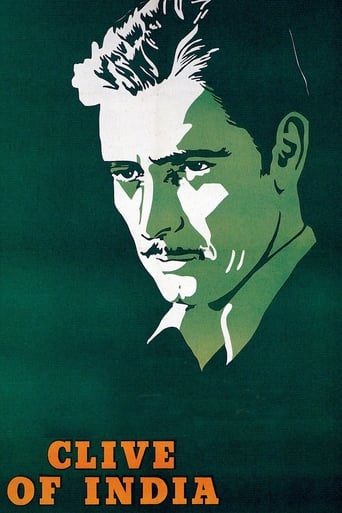

Funny in the last 20 min or so when Clive and his wife meet the General and an officer just back from India...to request Clive return for a 3rd time to fix things againNotice on the garden table his wife has left her laptop pc open during much of the scene. Hahaha....
... View MoreIndia, 1748, a vast nation , rich in jewels , spices and precious metals beyond the widness dreams . Fort St. David headquarters of the East India Company , a privately owned trading concern which enjoyed the protection of the British goverment . French , Dutch , Portuguese , and British are at each other's throats in an effort to stablish trading post in this ¨Paradise of Treasure¨. There a clerk in the company, Robert Clive , wants to promote himself and joins the army . Clive's leadership and gift for manipulation strengthen England's hold over India and lead to personal wealth , which is often threatened by the enemies he makes along the way . After that , there takes place the siege of Trichinopoly , where the entire British force had stumbled into a trap and faced almost certain annihilation , but nothing in history surpasses the amazing task Clive accomplished . As he captured Arcot , relieved Trichinopoly and in less than a year he became the conqueror were many , rich , honored , a hero , Clive returned to his homeland . Later on , a madman sat on the throne of Northern India , King Saraj Ud Dowlah , Clive offered him a proposition ; Saraj Dowlah's answer : ¨The Black hole of calcutta¨. But Clive's army came by quick and marches to Palassy , thugh theere was no Mr Jaffar . For ten days Clive waited but there was still no sign , no message . Waiting for Jaffar , Clive launched a sudden attack and before Suraj had time to counter , Clive had scattered the native army along India , but Suraj carried aout a counter-attack by elephants . This is a jingoist biopic , partially based on historical events , set In the mid-1700's when the East India Company had power over commerce on the sub-continent, with the blessings of the British government . It is a patriotic biographic movie about Colonel Robert Clive , but being more a romantic melodrama than a biopic or a historical film . It was panned by reviewers for giving an apology , being an ¨ode¨ to colonialism and British Imperialism . Nice acting by Ronald Colman as a tough man who at the beginning frustrated by his lack of advancement in his life , he then transfers to the military arm of the company, where he excels .His couple is one of the best stars of 20th Century Fox Film, the beautiful Loretta Young . Support cast is frankly excellent , plenty of notorious secondaries as C. Aubrey Smith as Prime Minister , Colin Clive , Francis Lister ,Cesar Romero , Montagu Love and Leo G. Carroll . And uncredited , John Carradine and Don Ameche as Prisoner . Rousing and evocative musical score by the classy composer Alfred Newman . Atmospheric and adequate cinematography in black and white by J. Peverell Marley . Impressive and breathtaking production design by Richard Day . The motion picture lavishly produced by Daryl F Zanuck , was professionally made by Director Richard Boleslawski . Richard was a prestigious filmmaker by making several important films at major studios like MGM and Fox before his premature death in January 1937. Among his most important directing assignments were Rasputin and the Empress (1932) (the only film in which John Barrymore, Lionel Barrymore and Ethel Barrymore appeared together), Men in White (1934) (Clark Gable and Myrna Loy), The painted veil (1934) (Greta Garbo), Les Misérables (1935) (Fredric March and Charles Laughton) and Theodora Goes Wild (1936) (with Irene Dunne) and a wide range of genres. He even directed a musical, Metropolitan (1935) (Lawrence Tibbett) and a western, 3 Godfathers (1936) (Chester Morris). His best film was his penultimate one , Garden of Alah (1936) (with Marlene Dietrich), the exteriors of which were shot in the burning heat of the southwestern American desert , until his early death at 48 .
... View MoreTo enjoy this film, you have to put behind you the modern viewpoint of the imperialistic British Empire. This was film was made at at time when imperialism was still looked at as being a great power "helping" a backwards nation. Things have changed, and no doubt a bio pic of Clive would be much different if made today. Incidentally, for those who don't know, Clive died from suicide...something that is not touched on in the film.But we're here to review this film, not world history. And I must begin with the 20th Century Fox DVD release in 2013 -- a CD-R version. Unfortunately, the archives of Fox were apparently not kept as well as those of Warner Brothers. This print is acceptable, but that means that it is below the standard of many titles from the 1930s. It's not painful to watch, but the deterioration of the negative will be on your mind.Since we have taken away the glow of history and the beauty of a film print, what is the main reason for watching this film? Ronald Colman. He's always a treat to watch on the silver screen, although here you will have to enjoy him without his famous mustache (as we also did in "A Tale Of Two Cities"). And, in the first two-thirds of the movie I found him overacting -- sometimes almost shouting -- something I'm not used to with the great Colman. Later in the film, that famous voice returns.Colman's romantic interest here is the lovely Loretta Young -- an actress whose fame we don't fully recognize today. She was only 22 here, but a well-established veteran in Hollywood by this time...and so beautiful. Her role here is decent, although clearly secondary to that of Colman.Colin Clive, who ironically was related to the title character, proves once again that he was a lousy actor. Within two years after the filming of this movie he was dead of complications related to alcoholism. Perhaps his drinking was urged on when he would watch his own performances on the silver screen.The only other actor specifically worth mentioning is Cesar Romero, who plays an Indian leader. Although he doesn't have a lot of screen time, it's interesting to see him at the age of 28.In terms of the script -- as much as I adore Ronald Colman, I found this film to be a bit of a potboiler...at least until the last third of the movie. It jerks around from one time to another with little apparent continuity early on. Films were evolving very quickly at this period of time...but this one seemed far more dated than I would have expected, particularly since Colman made "A Tale Of Two Cities" the same year and the monumental "Lost Horizons" just 2 years later. I'd have to blame it on director Richard Boleslawski, who never seemed to completely get past his background in silent films. Surprisingly, it paints Clive as having few scruples. At least I learned that I was completely wrong in terms of what I thought the Black Hole Of Calcutta was! In terms of battle scenes, it appears that the producers put all their money into one -- when the "monsoon breaks" -- which includes a rather dramatic sequence with armored war elephants. That is the one sequence in the movie which is truly impressive. For the rest of the film, things improve and it becomes very watchable.For quite a while as I watched I kept thinking the unthinkable -- that this DVD of a Colman film might end up at a garage sale. But, the latter third of the film redeemed itself quite a bit, so it will stay. However, I can't say that I particularly recommend this film, except for Colman fans.
... View MoreI love the period from the 1920s-1940s in film, however, there are a couple genres within this that I am less than fond of and try to avoid--such as musicals and costume dramas. Of course there are exceptions to the rule, but in general these are among my least favorite old films. With musicals, often the story seems unimportant and the songs dominate and with costumers, too often the tales look great and have nice sets and clothes but seem emotionally sterile."Clive of India", clearly, is a very sterile and dry film. Despite starring the wonderful Ronald Colman (one of my favorites), the picture comes off as episodic and amazingly dull. This is a shame, as the real life Sir Clive was an amazing man and as an American I am glad he fought in India and not North America--otherwise, we might still be a British colony! He was talented and yet also very screwed up (his suicide comes to mind) and how all this managed to be so dull is beyond me. I think it's because so much energy is spent on the sets and making it all look good that little attention was given to the script--the characters just seemed wooden and lifeless.Overall, you can watch it if you like, but I suggest you'd get more out of Wikipedia on this one!
... View More